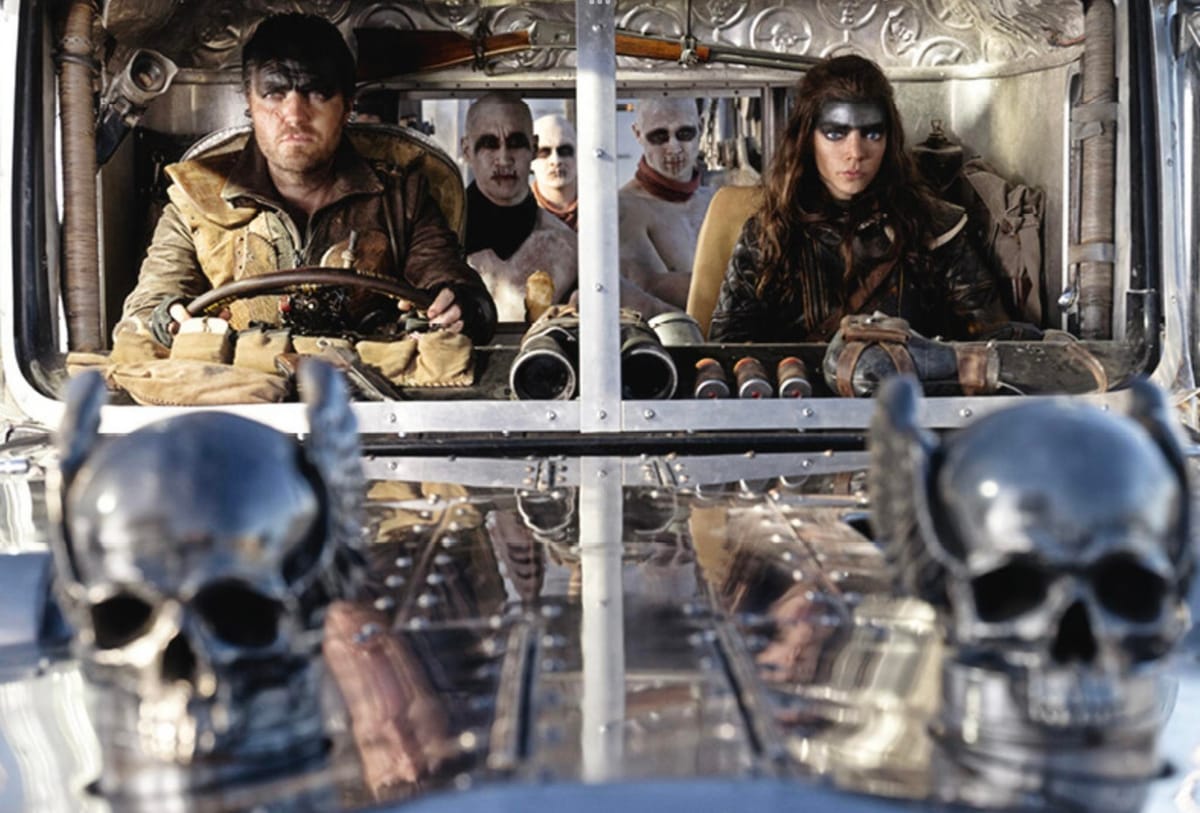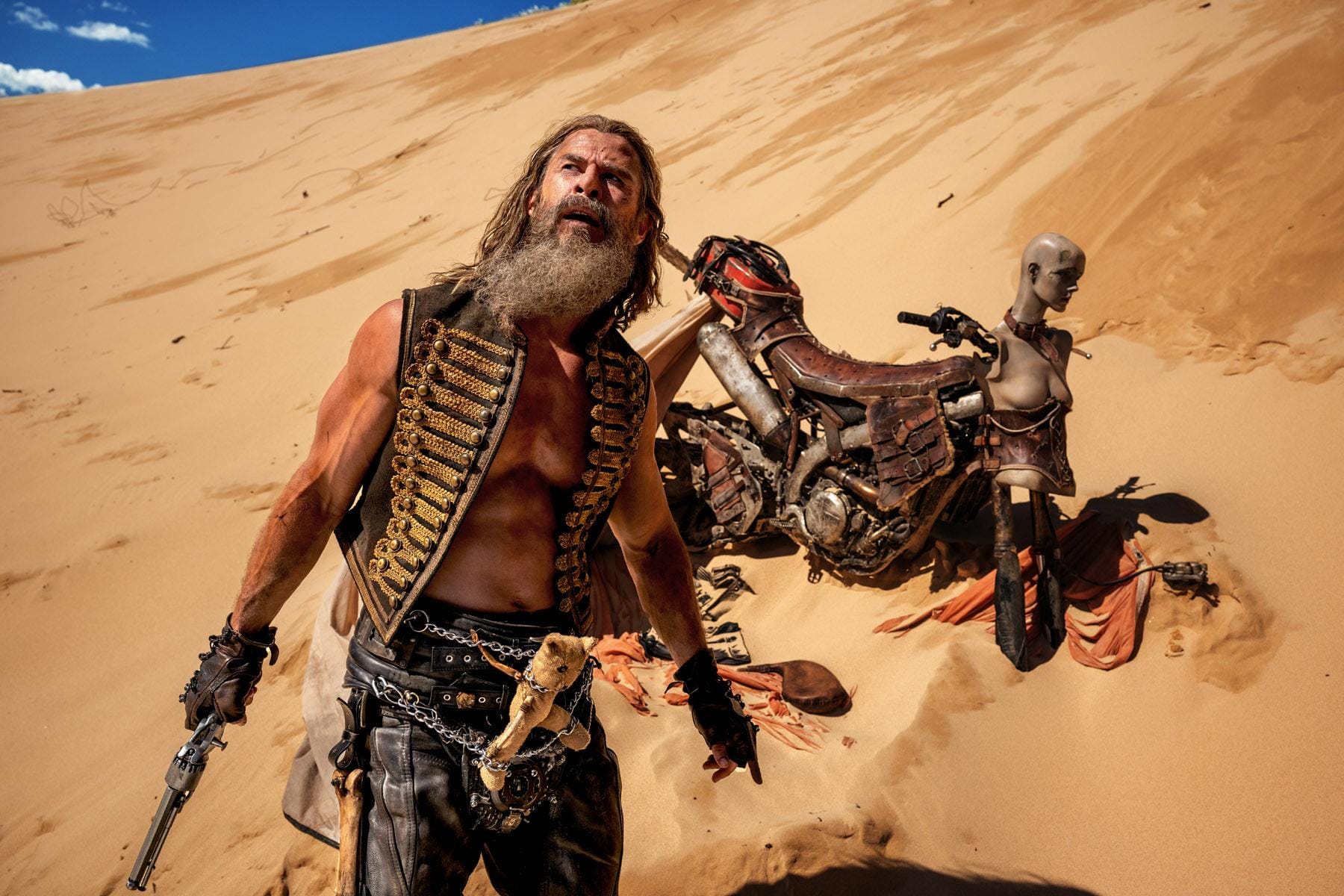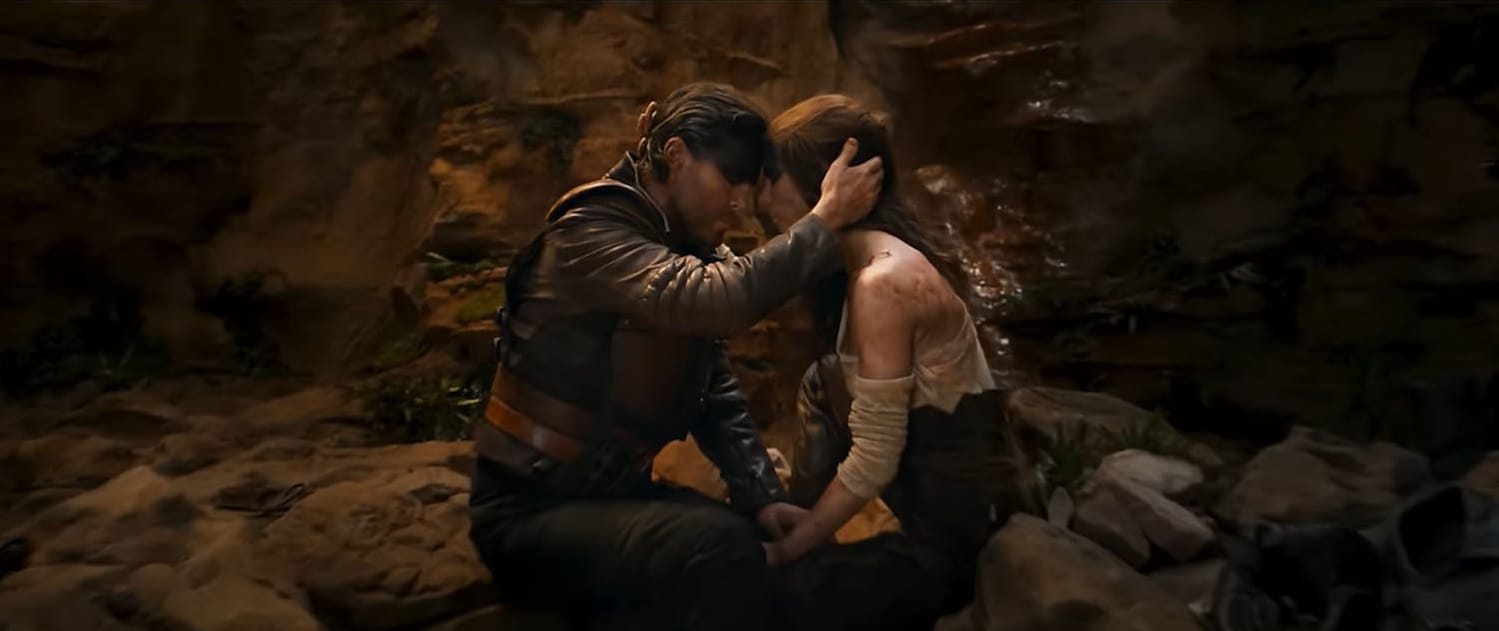Apocalypse world
How Furiosa is a classic epic for right now.

"Where were they going, so full of hope? There is no hope! Not for them, not for you, certainly not for me!"
George Miller's Furiosa is an odd film by almost any standard. It's the prequel to Mad Max: Fury Road, one of those instant classic films that seemed to shift how movies were made almost instantaneously, but Furiosa largely eschews being like the earlier film at all. It is haunted and elliptical, oddly paced with long stretches of contemplative silence that don't feel contemplative because Chris Hemsworth (playing the minor warlord Dementus) is shouting over them.
This is to say: It may be the movie that best captures what it's like to be alive in 2024.
Strictly speaking, the main difference between Fury Road and Furiosa is one of storytelling structure. The former is a fairly classic "chase" movie. It's perhaps the most expertly executed version of the chase movie, but you can find examples of the form going all the way back to the silent era, with Buster Keaton's The General a particularly famous example. That structure makes sense within the wider continuity of Mad Max films, in which Max is pressed into some sort of high-stakes situation begrudgingly, then finds himself caring about some of the others swept up in that situation. Max loses his family in the first film, and that trauma haunts him in all subsequent films. Each story is about him waking up from his grief-stricken slumber to care again. Then, he falls back asleep.
Furiosa takes a different tack. Befitting the character whose name is in its title, it is a steelier piece of work. Max can never regain what was taken from him, but Furiosa can. Taken from home as a young girl, she longs to find her way back, but she also abandons at least two seemingly bulletproof chances at escape to help others. The second, especially, stings. She's free and clear, with her own vehicle, able to point herself homeward, but she turns back to save her mentor and implied lover Praetorian Jack, who has been captured by Dementus. Once Furiosa rescues Jack, the two nearly escape, but Dementus chases them down, taking Jack's life and (unintentionally) one of Furiosa's forearms.
If we understand the entire Mad Max franchise as a series of legends passed around the wasteland about the same guy, legends that can occasionally contradict each other, then it's perhaps best to understand Furiosa as that approach condensed into a single film. It's not a chase story, nor a traditional origin story. Instead, it's a classic epic, turning Furiosa into a character like Gilgamesh or Beowulf, where the main story about her is that there are many stories about her. She was a girl, she was taken, and she longs to go back. Within that, there are infinite variations, with Fury Road serving as a sort of Rudolph and Frosty's Christmas in July of our imagined wasteland dwellers. In that tale, our two main characters finally get together to accomplish something neither of them could separately. In that tale, finally, is catharsis. And in that tale, finally, is the understanding that catharsis can never exist for these characters.
Furiosa isn't trying to pretend it's not a Fury Road prequel. Yet the way in which it structures its story – a choice that has much in common with Miller's flawed but fascinating 2022 film Three Thousand Years of Longing – has seemed to throw some viewers. Because it's a prequel, Furiosa cannot achieve catharsis, and we also know that the catharsis the character seeks will ultimately be denied to her in Fury Road. Since this is a classical epic, however, the point is that there's no catharsis. Furiosa will wake up tomorrow. She will want the same thing she always has. She will not get it. She will still do what good she can. So do normal people become legends.
Think, then, of Furiosa not as a prequel to an Academy Award-winning film but, instead, as an adaptation of a book you had to read in English class. By doing that, you'll start to get at the core of why I find this film so satisfying.
Consider becoming a paid subscriber: For as little as $5 a month, you can support this newsletter and help keep it rolling. Paid subscribers get a weekly post on Fridays that goes out even on weeks the Wednesday newsletter is dark, access to the full archives, a monthly mailbag, and a link to the Episodes Discord server. There will be some other fun treats along the way. Click the button to learn more!
Human storytelling began around campfires, at the end of long, grueling workdays. Even now, in an era where almost all storytelling is filtered first through the written word, that evolution has left behind little vestigial organs of the oral storytelling method. There is a reason we still turn out to hear authors read from their work, a reason good audiobooks still sell, a reason creepypastas are structured so frequently like campfire stories. Somewhere in our brains, we respond to this stuff.
If you look at these early tales, they tend to fall into one of two categories: epic heroes or moral instruction. For sake of argument, let's take a figure who straddles the line between the two categories: Moses, the Old Testament prophet who led the Israelites out of slavery in Egypt, then never reached the Promised Land.
What we have in the Old Testament is almost certainly a collection of core Moses stories, whittled down from a whole bunch of them told by early practitioners of what evolved into Judaism. Some may have contained a nugget of truth to them; even more likely did not. Most of those stories – the ten plagues, the parting of the Red Sea, etc. – are exciting tales of heroism, but then you'll also have, like, Moses receiving the ten commandments, as pure a story of moral instruction as you'll find. And throughout all of these tales is one underlying moral: Trust in the Almighty, and you will be delivered.
Implicit in almost all of these early epics is that idea of deliverance. Beowulf fights monster after monster after monster, protecting his people from the very worst, even as he grows ever older. There's less explicit moral instruction than there is derring-do, but the idea always is that the right king will lay everything down in a fight. Beowulf is allowed to have human frailties and foibles. He is not perfect. But he is someone who keeps to a pure, if violent, moral compass.
What I am getting at here is that almost all of these early stories utilize fiction as a kind of crude trauma processing mechanism. Being alive in almost any era before the modern one sucked intensely. Death was often random and terrible; lots and lots and lots of children didn't make it to the age of 5; diseases ran rampant; and even if you lived to a ripe old age, you would almost certainly spend the entirety of that life working some soul-crushing, body-breaking job. The simple pleasures of human life – good friends, a delicious meal, beautiful art, watching the sunset, etc. – have always existed, yes, but you'd forgive any random Bronze Age person for being, like, "Life sucks!"
Thus, early oral tales promise to give their listeners either escapism (life sucks, and this guy did something about it by killing a giant snake!) or meaning (life sucks, but it's not going to suck someday, thanks to this one weird trick). If you lost a child, if your body finally just stopped working, if you had some strange plague, if you just had a shitty day – these stories offered you a way to think about those perils that existed outside of yourself, if only for a little bit.
I am, of course, vastly oversimplifying millennia of human storytelling and human history to make my point, but my oversimplification serves two ends. First, it keeps this article a somewhat manageable length. Second, how we understand these stories now is perhaps even more important than the actual circumstances of their creation, especially as modern artists reinterpret them.
Everything I just wrote about Beowulf is stuff I half-remember from my college English Lit classes, but the odds are good you also half-remember it from roughly similar spaces. Just as a whole bunch of stories about these heroic figures got whittled down to the few that we know today, our understanding of this process has been whittled down to a few key facts that everybody can agree on. To move beyond that is to travel into the realm of academia, which would be fun, but we're not going there.
No, let's try thinking about Furiosa as a crude trauma-processing mechanism for right now.

Hemsworth's portrayal of Dementus in Furiosa has been compared to any number of modern would-be warlords. And while I see the comparison, I have come to think of him less as any specific figure and more as a kind of personification of the concept of doomscrolling. If hope has been stripped from the world, then all that is left is a hopefully entertaining performance of despair.
And Dementus is riotously entertaining! He struts through the film, a peacocking soccer dad. If Fury Road villain Immortan Joe obviously has a military background, Dementus seems like he might be a really talented preacher or, like, a hotter Bill Maher. He's a guy who assures you that you don't need to think about anything beyond what he's told you is true. Give in to the hopelessness, and your life will be better, he argues, because to give in to the hopelessness is to let him take over your life until you believe nothing beyond the brutal emptiness of the wasteland is possible.
As such, a lot of writing about Furiosa has focused on how Dementus steals the film out from under its titular character. I don't know that these pieces are wrong, simply because watching Hemsworth have a blast on screen is so much fun. Yet I think these pieces underemphasize the intentionality of this choice, how Furiosa and Dementus act as a dyad. In the grand tradition of the best antagonists, Dementus is more than an obstacle for Furiosa. He is a foil, by which I mean he represents a mirror in which we can view the main character.
As the film eventually makes explicit, both Furiosa and Dementus are trying to process the trauma of losing their family. Both carry around totems of that trauma (a teddy bear for Dementus; a peach pit for Furiosa). Both are aware that things used to be better, as it's implied Dementus lived pre-apocalypse to some extent and Furiosa came from the solar and wind-powered Green Place, a last vestige of human civilization. Both are set up as foils for Immortan Joe and Max (who is only briefly spotted in this film). And so on.
The only key difference is this: Dementus believes that the hopelessness of the wasteland is intrinsic to human life, and we might as well give it all up. Furiosa, meanwhile, believes on some level that better things are possible. She will escape. She will get home. In the moment I quoted at the start of this piece, Dementus is ranting about how hope is a poison even as Furiosa is holding onto Praetorian Jack one last time. She knows he's about to be taken from her; she also knows that she has these last few moments with him. She'll take them.
The need to let the pain and hurt you suffer settle into your bones so you might learn to live alongside it is key to everything Miller does in the film. The occasionally impressionistic visual effects don't need to look as practical as the ones in Fury Road because the ills Furiosa suffered have taken on an operatic tone within her mind. (Indeed, the shots in Fury Road these impressionistic VFX moments most resemble are the quick flashbacks to the girl Max was unable to save, whose unseen death hangs over the film.) Yet where Dementus uses his pain and hurt to fuel hopelessness and rage in the name of consolidating his own power, Furiosa almost always uses her pain and hurt to help other people.
Except when it comes to Dementus. She cannot return home until she kills him, and therein lies her tragic flaw. As Dementus points out in the film's conclusion – and its best scene – she is not going to fix her hurt by killing him. Killing him will only make the hurt larger. To heal trauma, you have to transmute it into something new, not replicate it. Or, to (sigh) quote Rent, the opposite of war isn't peace; it's creation.
Stop me if you've heard this one before (from me, even), but we are living through an era of unprecedented films "about trauma." Some of this is just marketers glomming onto a buzzword to make a genre film seem important, but some of it is a growing realization that we are on the precipice of calamities that might completely destroy our species.
Yes, that is always true – I was born at a time when it seemed as though global thermonuclear war could happen at any moment – but it is hard to shake that the planet might just look very different when I die, thanks to rising sea levels. We are both trying to fight back against this and trying to process the ways in which vast, global changes are going to happen, no matter what we do. And because we're still really bad talking about this in the realm of politics beyond empty buzzwords or outright denial, we're increasingly turning to art to do it for us. Is "this story is (sort of) about trauma" often just "this story is (sort of) about climate change"? Maybe!
But Furiosa really is about climate change because the Mad Max series takes place in a world where everything has been burned to a husk. This film and Fury Road both open with montages about how humans did this to themselves, via nuclear and environmental means. This is what is coming for us because this is who we are. There will always be war and death and destruction. There will always be cause for hopelessness.
Indeed, at times, it feels like we are living through a time when the most powerful among us insist that our lot in life is not what is best for us or even particularly good but what is most brutish and short. If you were forced to carry a child you did not want (or a child who could not survive) to term, if your body is not recognized by the state as your own, if you are marked by the plague we increasingly pretend just doesn't exist, if you are just having a shitty day – well, a figure like Furiosa gives you a way to think about transcending these ideas that isn't just, "Sucks to be alive, don't it?"
"Trauma" is not just a thing we are forever powerless against, forever captured by, nor is it something that can be glibly transcended. It is, however, something we can learn to live alongside. We can use the worst things that happen to us to sink into the muck; we can also use them to imagine a world where what happened to us will never happen to anybody else again, impossible as that might seem.

Dementus's totem of the past is a teddy bear, synthetic, not natural, a dead-end reminder of something lost that can never be regained. Furiosa's totem is a peach pit, which can, somewhat miraculously, create something new. What fuels the growth of the peach pit into a tree at the film's end isn't simply the soil but the soil as nurtured by Dementus's prone form, slowly wasting away.
We can still grow a new world out of the ashes of the old. To do so requires no longer listening to those who would tell us our problems are not solvable but to stay true to a map we perhaps only carry in our hearts. There is nothing broken that cannot be made into something new – not necessarily better but different, still good. The worst is not inevitable.
What is inevitable is growth and change. Whatever becomes of you and me, something will take our place. Beauty and horror will intermingle in it, whether we like it or not. Yes, yes, we carry within us the possibility of despair. We already know that. How lucky, then, that we also carry within us the possibility of renewal.
This week's reading music: "Real Talk" by Titus Andronicus
The free edition of Episodes, which (usually) covers classic TV and film, is published most Wednesdays, and the subscriber-supported edition of Episodes, which covers more recent stuff, is published every Friday. It's written by Emily St. James. If you have suggested topics, please comment (if you are a paid subscriber) or post in the paid-subscribers-only Discord.




